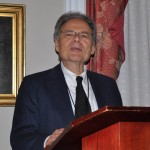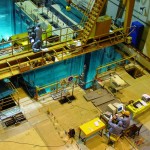- DETERRENCE: Navy launching its first drone copter squadron, Unmanned aircraft could eventually be on every ship
- DPRK: U.S. State Department officials in charge of Asia discuss post-election relations
- ENERGY SECURITY: How to make rich countries pay for climate change
- GOVERNANCE AND CIVIL SOCIETY: How new leaders in SK, US could affect ties with N. Korea
- CLIMATE CHANGE ADAPTATION: Changing climate, changing communities: guide and workbook for municipal climate adaptation
- CLIMATE CHANGE AND SECURITY: Climate linked to conflict in East Africa, study finds
Archives
Creating pathways to a sustainable future

Creating pathways to a sustainable future
by Saleem Janjua – Climate Change Adaptation Contributor
Climate adaptation strategies are essential for guiding the adaptation actions of local governments and for moving forward towards sustainability…
Regional Framework for a Comprehensive Security Settlement: Does It Work?

James Goodby writes that the Halperin proposal for a regional security mechanism in Northeast Asia suggests that some sections of the proposed Comprehensive Treaty would be adhered to by some of the signatories while others would be adhered to by all the parties. “For this reason, among others, it is useful to review the categories of security issues that need to be addressed, and by which states…Whether the Comprehensive Treaty is seen as a metaphor or as an actual document, the reality is that a security community in Northeast Asia can only be created through a comprehensive assault on all or most the issues that bedevil inter-state relations in that region of the world. Only a comprehensive approach offers the hope of ultimately eliminating North Korea’s nuclear weapons program.”
James Goodby is a Research Fellow at the Hoover Institution, Stanford University.
This report was originally presented at the New Approach to Security in Northeast Asia: Breaking the Gridlock workshop held on October 9th and 10th, 2012 in Washington, DC.
Nautilus Peace and Security Weekly – 1 November 2012
- DETERRENCE: PACOM supports China invite to RIMPAC 2014
- DPRK: Joint Communique, the 44th U.S.-ROK Security Consultative Meeting
- ENERGY SECURITY: Environment ministers pour cold water on ‘hot air’ proposal
- GOVERNANCE AND CIVIL SOCIETY: South Korea activists send leaflets to North
- CLIMATE CHANGE ADAPTATION: Living with floods: A grassroots analysis of the causes and impacts of typhoon Mirinae
- AUSTRAL PEACE AND SECURITY: Principles of Pax Pacifica: building the East Asia security order
Reformer Flame: Neutralized Moth. Why did Kim Han-sol do a TV interview?

Reformer Flame: Neutralized Moth. Why did Kim Han-sol do a TV interview?
by Roger Cavazos – DPRK Contributor
While Kim Han-sol’s recent video created a splash, his comments do not alter North Korea’s trajectory in any…
Promoting Security in Northeast Asia: A New Approach

Morton Halperin lays out a new approach to developing and implementing a process of regional security cooperation in North East Asia which will lead to a denuclearlized Korean peninsula. It proceeds from the premise that the prior approach to denuclearization has reached a dead end and that we need a new approach which takes account of where we are now and the fundamental interests of the two sides. Promoting this new process requires that the United States continue to maintain and strengthen its military capability, alliance relations, and the structure of global sanctions against North Korea by the UN Security Council and other means. However, the elements of the comprehensive approach to peace and security in Northeast Asia would also include: termination of state of war, creation of a permanent council on security, mutual declaration of no hostile intent, provisions of assistance for nuclear and other energy, and the establishment of a regional nuclear weapons free zone.
Morton H. Halperin served four US presidents and is currently a Senior Adviser at the Open Society Foundation.
This report was originally presented at the New Approach to Security in Northeast Asia: Breaking the Gridlock workshop held on October 9th and 10th, 2012 in Washington, DC.
Nautilus Peace and Security Weekly – 25 October 2012
- DETERRENCE: Assessing the undersea balance between the U.S. and China
- DPRK: S. Korea, U.S. set for defense ministerial talks
- ENERGY SECURITY: China nuclear report acknowledges safety concerns
- GOVERNANCE AND CIVIL SOCIETY: Doubts cast over Japan nuclear phase-out
- CLIMATE CHANGE ADAPTATION: Informing climate adaptation: a review of the economic costs of natural disasters, their determinants, and risk reduction options
See this week’s blog from our Energy Security contributor, Nikhil Desai.
Bridges to nowhere – promises, promises

Bridges to nowhere – promises, promises
by Nikhil Desai – Energy Security Contributor
Some thought the moment to save the earth had passed in Copenhagen nearly three years ago. Phew!! What a relief!!!…
An Initial Exploration of the Potential for Deep Borehole Disposal of Nuclear Wastes in China

Although China’s nuclear power industry is relatively young, and the management of its spent nuclear fuel and nuclear waste is not yet a major concern, China’s commitment to nuclear energy and its rapid pace of nuclear generation capacity development require detailed analyses and planning of its future spent fuel management and nuclear waste policies. Specially, China is moving forward on its commitment to operate a closed nuclear fuel cycle, a policy that was first articulated in the 1980s. Figuring out how to manage and store the high-level nuclear waste resulting from reprocessing—a necessary part of a closed nuclear fuel cycle—could be a challenge for China.
This report reviews China’s spent fuel management policy, including its plans for reprocessing, including and China’s nuclear waste management plan, and explores the feasibility of deep borehole disposal (DBD) as an alternative to at-reactor, centralized surface- and near-surface storage, or mine geologic storage of spent fuel and high-level nuclear waste.
Yun Zhou is a postdoctoral research fellow at the Belfer Center’s Project on Managing the Atom and International Security Program.
Nautilus Peace and Security Weekly – 18 October 2012
- DETERRENCE: An interview with Carl Kaysen
- DPRK: 2012 Global Hunger Index background facts and key findings
- ENERGY SECURITY: Tepco finally admits nuke crisis avoidable – Utility feared vital safety steps would hurt image
- GOVERNANCE AND CIVIL SOCIETY: Presidential hopefuls urge Asian détente
- CLIMATE CHANGE ADAPTATION: Drying up – what to do about droughts in the People’s Republic of China
- AUSTRAL PEACE AND SECURITY: China choice: Thai parallels for Australia

